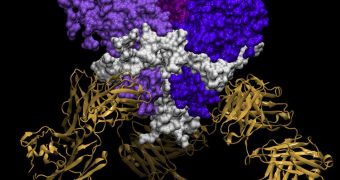American researchers announce the development of a new vaccine against a highly-dangerous species of the ebolavirus. Their accomplishment could mean the eradication of a major pathogen for humans, while opening the way for studies on creating vaccines against other ebolavirus species as well.
The bug in question is called the Sudan virus. The antibody identified in the new study is able to destroy it with minor efforts, and researchers are very hopeful that the drug will make its way to the market relatively soon.
The investigation was led by scientists with the US Army Medical Research Institute of Infectious Diseases (MRIID) and the Scripps Research Institute (SRI), in La Jolla, California. Researchers worked together to identify, and later analyze, the antibody.
What's even more important is that the joint team may have in fact discovered a weak spot of all ebolavirus species. This announcement was made by SRI associate professor Erica Ollmann Saphire. She and MRIID virologist John M. Dye were the leaders of the new investigation.
Details of the research effort were published in the November 20 advance online issue of the top journal Nature Structural & Molecular Biology, AlphaGalileo reports. The group adds that the antibody may also prove effective against the renowned Ebola-Zaire viral strain.
The reason why this study is so important is that the ebolavirus family is extremely lethal to humans. When infected, individuals develop strong hemorrhagic fevers, which kill about 90 percent of patients.
In the new investigation, researchers were able to observe that the antibody they discovered was linking two segments of a coat protein on the viral agent together, essentially limiting the microorganism's movements, as well as its ability to infect health cells.
Since the protein is present on many ebolavirus strains, researchers have great hopes of fine-tuning the antibody so that it might become effective against several other viral species as well. Scientists will now most likely focus on developing new vaccines and antibody-based therapies based on these findings.
“These species differ enough from each other that neutralizing antibodies to one don’t protect against the rest. Sudan virus is a particular concern because it has caused about half of the ebolavirus outbreaks so far, including the largest outbreak yet recorded,” expert Ollmann Saphire says.
“We were very excited about developing this antibody as a potential treatment for Ebola virus. Collaborating with the Ollmann Saphire lab to determine the binding site was the perfect complement to our previous work,” Dye explains.

 14 DAY TRIAL //
14 DAY TRIAL //